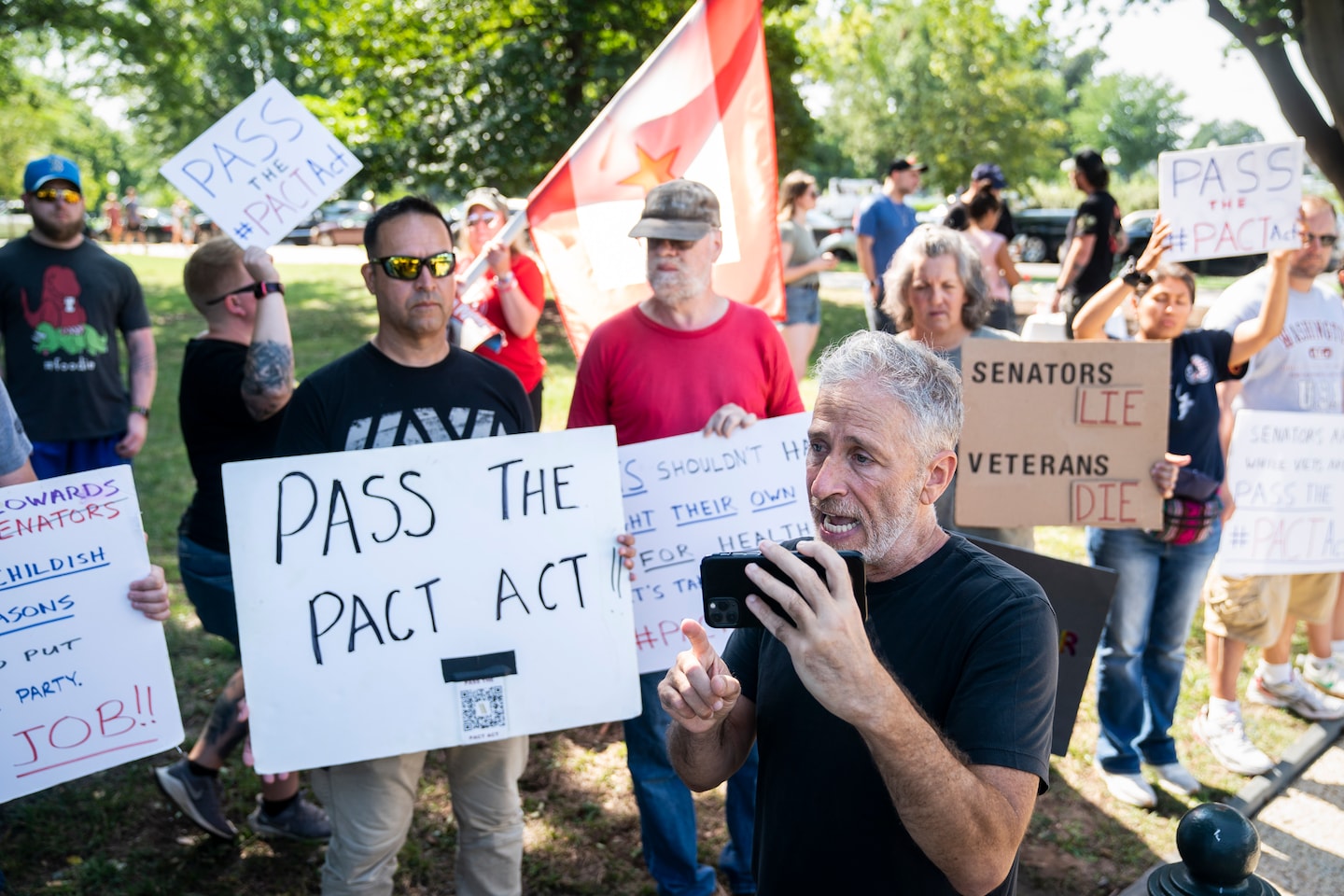Republicans tried for several days to contend that last Wednesday’s blockage of the PACT Act had to do with a technical argument about which portion of the federal budget would fund $280 billion worth of new allocation for veterans health programs.
But 25 Republicans who had recently supported the exact same bill switched their votes last Wednesday, less than an hour after Senate Majority Leader Charles E. Schumer (DN.Y.) and Sen. Joe Manchin III (DW.Va.) announced their deal on the ambitious legislation unrelated to the PACT Act.
Republicans absorbed a series of political blows, led by comedian Jon Stewart and several prominent veterans groups, that, by lunchtime Tuesday, left many ready to settle the matter and vote to send the legislation quickly to President Biden’s desk.
“He just beat the daylights out of them,” Schumer said Wednesday in a celebratory visit to a couple dozen veterans who have set up a vigil on the Capitol’s north lawn since last week’s failed vote.
Democratic leaders allowed Stewart and dozens of veterans, their families and other supporters into the chamber’s public gallery for the final series of votes — something that has happened less than a handful of times since the onset of the global pandemic in March 2020 prompted officials to not allow the general public into the House and Senate galleries.
In the end, 37 Republicans joined 49 members of the Democratic caucus to vote for the legislation, which compels the Department of Veterans Affairs to presume that certain illnesses came from exposure to hazardous waste incineration, mostly focused on the issue of burn pits from recent wars in Iraq and Afghanistan.
That would remove the burden of proof from the injured veterans.
Sen. Patrick J. Leahy (D-Vt.) missed the vote because of a recent hip-replacement surgery.
In the final moments of debate, the activists grew emotional. Stewart, who took up the cause following a similar effort he helped lead for first responders who suffer lingering effects from the 9/11 site, put his head in his right hand and started to cry as the roll call began. The crowd lit up with brief cheers when the gavel fell, getting quickly admonished by officials for breaking decorum that requires silence.
Asked to explain the GOP reversal, Minority Leader Mitch McConnell (R-Ky.) offered no broad explanation and acknowledged the legislation would pass with broad support.
“These things happen all the time with the legislative process,” McConnell told reporters at his weekly news conference, conceding defeat. “I think in the end the veterans service organizations are going to be pleased with the final result.”
Sen. Jon Tester (D-Mont.), chairman of the Senate Veterans Affairs Committee, credited the veterans groups and Stewart with taking what was previously a relatively obscure health issue and turning it into a national cause.
“That’s who really did it, that’s who elevated it,” Tester said as he joined Schumer at the impromptu celebration outside the Capitol.
Biden also gave the issue prominence in his March State of the Union address, followed by a trip to a Texas community the next week to drive home its importance.
“We’re following the science in every case, but we’re also not going to force veterans to suffer in limbo for decades,” Biden said during the March visit to Texas.
In his remarks, the president has noted that his son Beau served in and around Baghdad as a judge advocate general in the Delaware Army National Guard, on bases where waste was burned in an open-air site.
The state’s attorney general, Beau Biden died in 2015 from brain cancer, although no diagnosis ever connected the cancer to his service in Iraq or other overseas postings.
“While we can never fully repay the enormous debt we owe to those who have worn the uniform, today, the United States Congress took important action to meet this sacred obligation,” the president said in a statement after Tuesday’s vote. “Congress has delivered a decisive and bipartisan win for America’s veterans.”
In a sign of his own devotion to the issue, the president planned to surprise the veterans holding vigil outside the Capitol over the weekend with a pizza delivery, but he tested positive for a rebound coronavirus case and summarized his quarantine.
Instead, Veterans Affairs Secretary Denis McDonough arrived with the pizza.
Experts are often uncertain of a direct link between specific cancers or diseases and the burn pits in Afghanistan and Iraq, where the military often burned large amounts of waste — including plastics, batteries or vehicle parts — that released plumes of dangerous chemicals into the air.
Veterans then have to prove there is a direct connection between their cancer and the burn pit chemicals, a threshold that can at times be difficult to meet, particularly if the condition doesn’t develop until years after a deployment. Studies have shown that Veterans Affairs rejects the vast majority of claims.
“You could talk to any one of these people and they would say we would rather not be here,” Tester said.
Schumer took a similar approach, happy the legislation finally passed.
“All’s well that ends well.”
